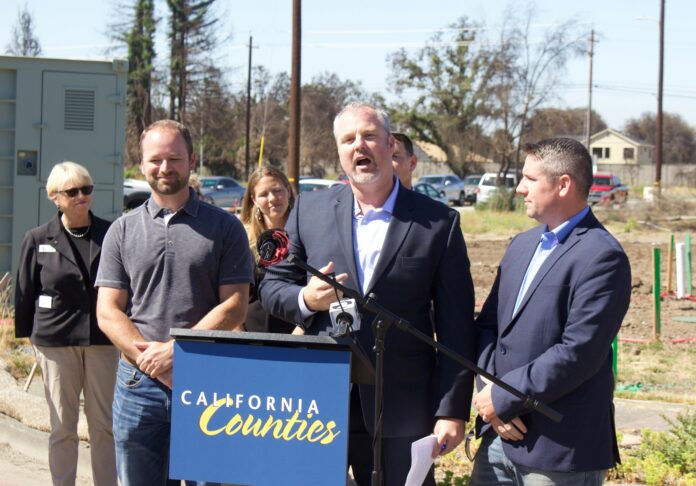Taxpayers and victims may foot the bill for future natural disasters caused by utilities companies if proposed state legislation passes, wildfire survivors and local government representatives said at news conference in Santa Rosa July 11.
Supervisors from Sonoma, Napa and Mendocino counties joined wildfire survivors in front of where Wikiup resident Brad Sherwood’s fire-destroyed home once stood, urging lawmakers block the proposed legislation, which would make it more difficult for victims like those of the October, 2017 wildfires to sue for damages against utility companies.
The legislation, currently under review by a special committee of state legislators, would abolish “inverse condemnation” laws, a cornerstone in establishing liability for investor-owned utilities like Pacific Gas and Electric. Under inverse condemnation, public utility companies, which work closely with local and state governments, are held liable for any damages to property they cause, regardless of negligence.
“[The legislation] would essentially shift their liability onto the taxpayers in the event of damage and destruction,” said Cyndi Foreman, fire prevention officer for Rincon Valley/Windsor Fire Protection District.
Foreman said 80 percent of those who lost their homes were under-insured by an average of $300,000. The scope of the damage raised the price of rebuilding in a county where housing costs were already prohibitive.
Sherwood said local governments, particularly those impacted by the recent wildfires, need to be included in discussions that would affect them.
“I don’t want to be standing in front of my house talking about this with the media,” Sherwood said. “We would love to have this conversation with PG&E.”
“We’re going to stand united with this group here to make sure all our voices are heard loud and clear. The fact is, they need to bring more local representatives to the table to represent wildfire survivors—bottom line.”
Wildfire survivor and former Sonoma County public works director Phil Demery said, “Changing utility liability laws will have a direct impact on our ability to stay in our community and to rebuild our lives. We can’t let that happen.”
Supervisor Gore listed three demands for the state legislature: that local governments be included in the conversation; that proposed changes to liability laws be slowed; and that partnerships form between local governments and public utilities to prevent and respond to wildfires.
“We’re not here to talk about PG&E being a good company or a bad company. Any talk about ending inverse condemnation or other things—we need to be there,” Gore said.
“We need to work hand in glove with the governor’s office and our legislative representatives to get it done right. They’re in it to do the right thing, but we need to be at the table helping them to get there.”
Graham Knaus, executive director of California State Association of Counties, said liability laws protect victims of utility-caused natural disasters.
In a July 10 letter to Gov. Jerry Brown, Knaus defended inverse condemnation because it incentivizes utilities companies to act in the public interest while giving private citizens and local governments a fighting chance in legal battles against powerful companies.
The proposed legislative changes would not work retroactively, so they would not affect October wildfire victims. The official’s main concerns were that legal changes would adversely affect communities in future disasters.
According to Cal Fire, utility equipment caused 16 of the 2017 North Bay wildfires. Of those 16, Knauss said, 11 are under criminal investigation.
The state legislature, currently on summer recess, will reconvene in August for its final bill-passing session of 2018.









